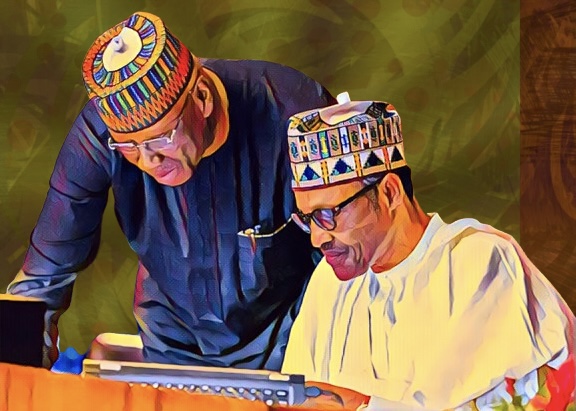A forensic expert has testified in court that the signatures of former President Muhammadu Buhari and ex-Secretary to the Government of the Federation (SGF) Boss Mustapha were forged to withdraw $6.2m from the Central Bank of Nigeria (CBN) in 2023.
The money was allegedly claimed by a former CBN governor, Godwin Emefiele, and an accomplice, Odoh Ocheme, who is still at large, as a presidential directive to fund foreign election observer missions.
The Economic and Financial Crimes Commission (EFCC), which is prosecuting the case, said the duo forged a document titled: “RE: PRESIDENTIAL DIRECTIVE ON FOREIGN ELECTION OBSERVER MISSIONS,” dated 26 January 2023 with Ref No. SGF.43/L.01/201.
How the fraud was exposed
Bamaiyi Haruna, a forensic document examiner attached to the EFCC, told the court on Thursday that he analyzed the disputed document and the specimen signatures of Buhari and Mustapha and found them to be different.
He said the form and formation of the signatures showed evidence of forgery and copying art, as the pen movement, skill of execution, loop formation, and presence of tremors were not consistent with the genuine signatures.
He also said the disputed document did not have any security features, such as watermarks, that are usually found on official documents from the presidency.
Haruna said he submitted his report to the EFCC on January 25, 2024, and it was admitted as evidence by the court.
The defense’s cross-examination
Mathew Burkaa, the lawyer for Emefiele, cross-examined Haruna and asked him how the court could determine whether two signatures are similar or dissimilar.
Haruna said the court could rely on his report, which was based on scientific methods and standards.
Burkaa also asked if Emefiele’s signature was analysed, and Haruna said no.
He said the EFCC operatives who submitted the request to his department did not include Emefiele’s signature as part of the investigation.
The implications of the case
The case is one of the biggest corruption scandals in Nigeria’s history, involving a former head of state and a former central bank chief.
It also raises questions about the security and integrity of the country’s financial system, as well as the credibility of its electoral process. If convicted, Emefiele and Ocheme could face up to 14 years in prison, according to the EFCC.
The trial has been adjourned till March 11.
Despite the shocking revelations of the case, some Nigerians have expressed hope that justice will be served and that the culprits will be held accountable.
They also praised the EFCC for its efforts to fight corruption and recover stolen funds.
Some civil society groups have also called for more transparency and accountability in the management of public funds, especially during elections.
They urged the government to implement electoral reforms and strengthen the oversight of the CBN.
Source: Punch


